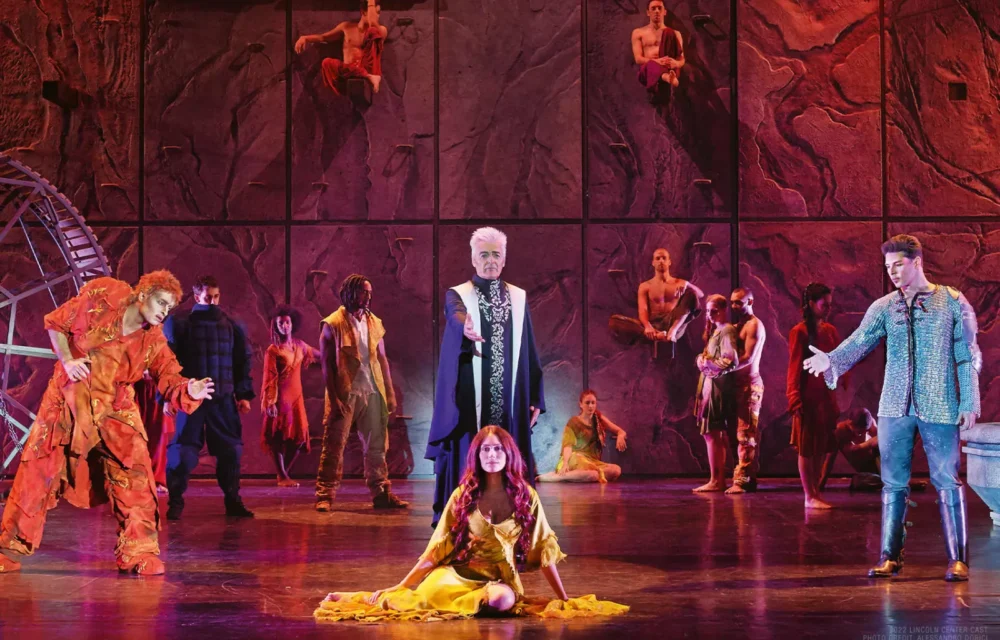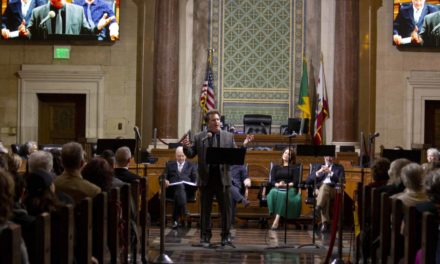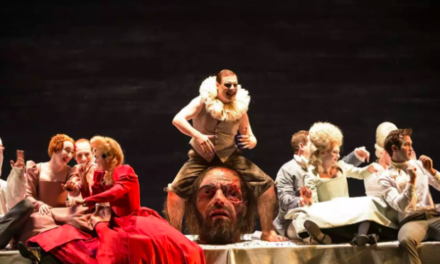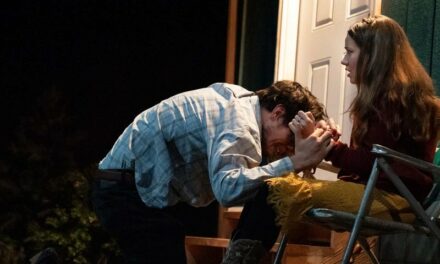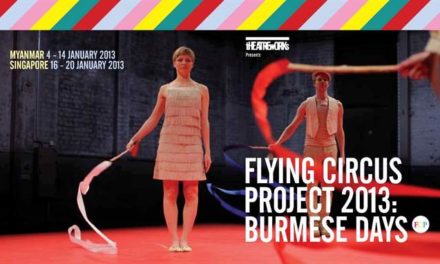It has become a beautiful annual tradition: welcoming the musical Notre Dame de Paris at New York City’s Lincoln Center in July. Daniel Lavoie, who originated the part of Frollo in the musical, returned to the US for the second time with the show. He spoke to Lisa and shared his thoughts and feelings about the revival of the musical and its future, as well as the character that became so important in his career.
Lisa Monde: Daniel, today I would love to talk to you about musical theatre. I am so excited and impressed that you came to New York with the musical Notre Dame de Paris for the second time already. I saw you last year. I know Notre Dame very well, this musical truly means a lot to me. I saw it for the first time back in 2001, in Europe, and I completely fell in love with the show. And your Frollo.
Daniel Lavoie: Was it in London? I did the opening of the English premiere, but then I left rather quickly.
LM: Yes. Later on, I saw various versions and listened to Notre Dame de Paris in many different languages. Now, you’ve originated the role of Frollo. How does it feel being back with Notre Dame, bringing it back so many years later? And how do you feel about turning into Frollo once again?
DL: I’m having a great amount of fun! I enjoy this very much. I’ve been writing music and doing all kinds of things for many years, and I had stopped performing in Notre Dame. When they asked me to come back, I didn’t know what I wanted to do with my life at the time, and Notre Dame seemed like a good idea – why not? I went back into it with a bit of hesitation, and I must say that I have not hesitated since because I’d been having great fun. I don’t experience the “stress of creation” anymore. When we worked on the show for the first time, it was kind of a mass hysteria in France and Canada, where Notre Dame was bigger than the Beatles for a couple of months. It was huge. There was a lot of stress involved. And coming back this time – it was all about the part that I love, which is – the theatre, the singing, the discipline, working with the people, the team – that is the part that I love about my job, and I just get to do that now. I don’t have to do other stuff that comes with it and that’s great!
LM: You were the only one from the original cast returning to this production in New York. How do you feel about the new production? When I saw the show, I’ve noticed some changes. The look of it, some adjustments in choreography. How was it for you to work with the new cast? How did you feel about the changes that were introduced into the show?
DL: Well, the changes are not very big, except for maybe one choreography which I have nothing to do with, it’s not in any of my scenes. Basically, it’s all just a bit of tightening corners and making things a little better, at least according to the composers and the director, who felt like there were some places where they could make adjustments and make things better. I guess, the costumes have become a little more colorful to go with the period. It was a little more intellectual in 2000. I don’t feel that the show has changed a lot, the great part about this show is that it wasn’t broken, nobody fixed it. When you come to see Notre Dame de Paris – you know what you’re going to get. It’s like when you want to have some good food, you want it to be the same as the last time you had it, and that’s the way with Notre Dame. When people come to see it again, and again, and again, they know what’s going to happen, they can just enjoy it. And that’s great, I love that type of audience.
LM: It was such a special experience seeing the show after so many years again. I went to see it with friends, who also saw the show in Europe in the early 2000s. It was such a trip down memory lane. We remember this show from 20 years ago. To see it now again – is very touching and truly amazing. Now, what about Frollo, as a character – so many years have passed, you’ve changed, you’ve lived a life – how did Frollo change?
DL: I’m lucky to have the character who is probably the most challenging and complicated character in the show. He’s the only one who’s not a stereotype. I think, all the other characters are all stereotypes – there’s a pretty girl, there’s the bad rich guy, the stupid girl… – they are all clearly stereotypes… But Frollo is like the kingpin – he makes everything happen because of his humanity. He’s probably the most human person in the show. Because he’s weak, he’s strong, he gives in to his temptation and yet he always has a moral dilemma going on in his head. And that’s great to have. Because you can just go on forever looking into the details of the character. That’s what I do, I’ve been working on Frollo’s details for the past five years. And I’m having a great time doing it.
LM: Interesting that you’ve mentioned “working on the details” of your character. That is exactly how Bruno Pelletier phrased it in our interview. That it’s all about going into the details this time around.
DL: Actually, Gringoire is the second character who is not a clear stereotype in the show.
LM: To you, what was the biggest change for Frollo?
DL: The costume. That was the one condition I asked for before coming back – I told the producer that I will come back under one condition – I wanted him to give Frollo an archdeacon’s costume, and I wasn’t going to return as a parish priest. I think he has no way of showing authority, no actual way of being bigger than life… and so they gave me this costume which works for me now because it’s much more impressive and that’s how Frollo is – when he comes on stage, everyone is afraid of him. When he came on stage in a little parish priest outfit, no one was afraid of him. And I had to work on that twice as hard. I keep working hard, but I think with such a new costume – the effect is stronger.
LM: Absolutely! I believe, you had a costume change too – you alternated between two cloaks in the show – one with silver lapels and the other – with red lapels.
DL: That’s right. Honestly, the rest hasn’t changed. The rest is all me, I interpret him the way I think he should be but that is very personal. I just worked on his humanity and his inhumanity.
LM: How do you see Notre Dame’s future? Do you think there will be more new productions coming up? How do you think Notre Dame is going to develop in the future?
DL: I wish I could tell you, Lisa. I have no idea. I’m amazed that Notre Dame is still a show that is pertinent, that it makes sense to people today. It’s not like one of these old musicals from the 1950s – they don’t correspond to anything that we are living through now, and Notre Dame still does. Because of these clear stereotypes that are recognized throughout the years, and because of the subject. And, probably, the choice of not having any dialogue – just going from one tableau to the next – it was very modern in 1998 and it still seems that way. As for the future, I wish I could tell you how the future is going to be. If they maintain this level of quality of the show, of performance – because it has to be credible. People have to believe what’s happening. If you don’t believe in it – it loses all the charm. So, if they keep the show at this level, I think it can go on for a long time. It is going back to China next year for a couple of months. I don’t know if I’ll be doing all the shows. I know we’re going to Paris, France, for another three months this year. So, there is still apparently a good future for Notre Dame de Paris. But I don’t know how long it will last.
LM: Let’s hope there is a great future out there for Notre Dame de Paris for all of us, our children and grandchildren. It is such a wonderful and important musical that I hope more and more generations get a chance to see it.
DL: I agree with you. It’s not a banal show.
LM: Now, you have been working with different actors, who are also playing Frollo. You’ve seen others play the part. Do they come to you for advice? And what is your main advice to them on how to approach the role? Since you are the one who originated it.
DL: I think they do a lot of looking at me from the wings. I try not to give too much advice, you know. I let people do what they do best. And I try to give the best advice by just being the best that I can be. Also, I’m not a director. The only advice that I could give them is to make their Frollo as “living,” and as “credible” as possible. That’s the main trick in theatre – to make everything very believable so that people get that suspension of disbelief, and they actually believe all that’s happening. It’s not easy. You work in theatre yourself, so you know all about the suspension of disbelief. It’s not easy, you have to earn it.
LM: I always say – you have to believe in what you’re doing, and you have to make it as believable to yourself as possible first and foremost. Because if you don’t believe, then the audience is not going to believe.
DL: That is very true. I had a great friend in Montreal who used to tell me – you’re never better than the worst guy in the band. He was talking about concerts. You know, when you get a band together, everybody is as good as the worst guy in the band. And it’s the same in theatre. If one of the characters is not credible, everyone becomes less credible. Which is very important to me. I live by that.
LM: How is the dynamic within the new cast? How is the collaboration going?
DL: I think I started working with the team in 2017, before the pandemic. It is a great cast; I love their dedication. The dancers and the acrobats – everyone is really professional. There are no baby egos that are giving a hard time to anyone. I feel that most of the time everyone is giving one hundred percent. And I get along with everyone.
LM: I’m sure you’ve heard Notre Dame in different languages. I always find it interesting how people approach translation, how they make the lyrics sound in a foreign language, and how it all goes with the original music. Do you have a favorite translation out of the ones you’ve heard?
DL: Yes, the Italian one. Because it sounds good. And I know it’s well translated because Richard Cocciante speaks Italian very well and is very much into details. I may not have understood every word – but I still think that the best translation is probably the Italian one. I found the English translation to be a little brutal. It sounded a bit Disney-ish to me. Everything was black and white, it didn’t have all the subtleties that Luc Plamondon put into the French libretto, where the lyrics hold so many nuances. And the English translation is very “limited.” I left the English production after a while, I felt cramped in the character. One of the reasons why the French production is working so well is that even if you don’t understand the language, the subtleties, and the colors come through anyways through emotion and in the way that it’s delivered. Like with any opera, because Notre Dame de Paris is almost an opera, it’s got to be in the original language. I can’t imagine listening to Bizet or Puccini in English. It seems to me that it would make no sense.
LM: I agree, nothing is better than the original. What is your favorite song from Notre Dame?
DL: Florence is one of my favorites. Because it reveals another side of Frollo. But I think I like them all! None of them stands out as being the showstopper. But Florence is melodically the one that I prefer because the rest of the songs are less melodically satisfying to me. Frollo has some pretty good songs! They are fun to do.
LM: I agree. I’ve always loved Florence. Now, you have worn so many hats – you are a composer, an actor, a singer, a pianist, a poet, a producer. You’ve done so many things! What part is your favorite? What do you like to do the most?
DL: Oh boy… If you asked me what was my least favorite, then I would have trouble telling you too. I think every one of them as I do them is my favorite. That’s why I’ve always been going from one to another. I try not to get bored with some things. When something comes along that is different – I jump into it because this way I can discover a bunch of new stuff and get into a completely new world. And this way it remains interesting. So, everything that I did was pretty much my favorite.
LM: Always hard to choose, right?
DL: It’s true. I love singing, I love acting, I love producing, when I produced songs for other people it was great fun – to be of service to someone, to make the best of someone is really great fun. One of the things that we love to do in life is – giving. I am a very lucky person; I never worked a day in my life – I played all my life.
LM: Have you ever wanted to write a musical yourself?
DL: I have written a musical. I’m currently working on trying to get it produced. I try not to talk too much about anything until it’s out there. A friend of mine wrote a lovely libretto. And we have a bunch of great songs. Now what can we do with it? I hope you will hear about it someday soon. There’s a lot of work that goes into making a great show happen.
LM: It takes time.
DL: Yes, it does.
LM: That’s so exciting. I’m looking forward to hearing and seeing your show when it gets produced.
This post was written by the author in their personal capacity.The opinions expressed in this article are the author’s own and do not reflect the view of The Theatre Times, their staff or collaborators.
This post was written by Lisa Monde.
The views expressed here belong to the author and do not necessarily reflect our views and opinions.

